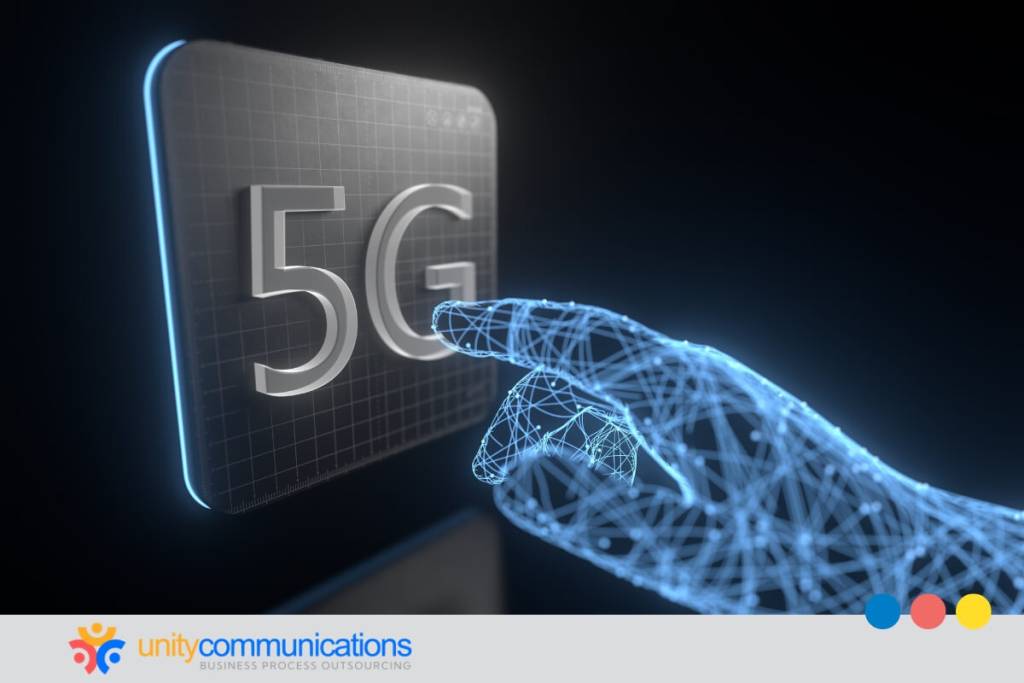IN THIS ARTICLE
Table of Contents
The rise of 5G technology is pushing the boundaries of industries worldwide, including business process outsourcing (BPO). With ultra-high-speed internet, 5G promises to bring BPO operations to unprecedented efficiency. Imagine seamless remote work, real-time data processing, and improved client service delivery.
The impact of 5G on business process outsourcing is significant. It can potentially change how BPO firms operate and deliver value. Keep reading to learn how this technology can reshape the BPO industry!
5G: Definition and key features

Launched pre-pandemic, fifth-generation mobile technology is the new standard for telecommunications. Although running on the same radio frequencies as its predecessors, 5G boasts ultra-wideband, reduced latency, and higher speeds. These features translate to seamless streaming, rapid downloads, and more reliable connectivity.
With reduced latency, data transfer times drop to mere milliseconds. This speeds up real-time communication, which is crucial for remote medical procedures and autonomous vehicle applications.
5G coverage continuously expands globally, enabling access to high-speed internet even for remote areas. This widespread coverage supports innovation and economic growth.
5G’s ability to handle simultaneous connections is perfect for the growing number of Internet of Things (IoT) devices. From smart home appliances to industrial sensors, these tools depend on constant, reliable internet. The speed and stability of 5G networks ensure the efficient operation of these devices, driving the IoT revolution forward.
The current state of worldwide 5G deployment
As of 2023, 5G connections have reached about 1.76 billion worldwide. This could balloon to 7.9 billion by 2028, highlighting the rapid adoption and expansion of the technology.
Countries leading its growth include the United States, South Korea, China, Japan, and Germany. These nations have advanced telecommunications infrastructure and solid government support, accelerating 5G deployment efforts.
Widespread 5G adoption has its challenges. High infrastructure costs, spectrum availability, economic conditions, and geopolitical issues complicate its deployment.
Despite these roadblocks, 5G continues to gain momentum. This expansion is particularly significant for the BPO industry.
As 5G adoption continues to increase, its benefits to what BPO aims to achieve become more apparent. Higher speeds and lower latency help improve efficiency and service delivery. The growing 5G network could transform how BPO companies operate, offering new opportunities for innovation and growth.
The impact of 5G on operational efficiency in business process outsourcing

The impact of 5G on business process outsourcing is manifold. First, it helps maximize business efficiency and productivity, especially for firms boasting remote work capabilities.
With 5G’s higher speeds and reduced latency, remote workers can collaborate better. They can access large files faster and enjoy high-quality video conferencing without interruption. Managing a distributed workforce is smoother and more productive.
5G also facilitates real-time data processing and analytics, which are essential for BPO operations. Big data management allows BPO firms to leverage augmented reality (AR), machine learning (ML), and artificial intelligence (AI). These tools enhance customer interactions, automate routine tasks, and help accurately predict trends.
The impact of 5G on business process outsourcing extends to customer service. With faster and more reliable connectivity, customer service representatives can quickly access real-time information and resolve questions. As a result, customer experience, client satisfaction, and customer loyalty improve.
Moreover, integrating 5G into BPO operations opens up new avenues for innovation. For instance, using 5G in driving vehicles can streamline logistics and supply chain management through real-time tracking and route planning. BPO firms can offer these services to clients, expanding their 5G business while staying competitive.
Challenges of integrating 5G into existing BPO infrastructures
5G offers undeniable advantages to the BPO industry. However, integrating this technology into existing infrastructure poses several challenges.
Let’s go into more detail:
- Upgrades. To use 5G to its full potential, BPO firms must invest in new hardware and software, such as IoT sensors and advanced network equipment, which can be expensive and tricky to procure.
- Cost of deployment. Building the necessary network of 5G towers, small cells, and fiber-optic cables requires a substantial financial investment. Many BPO companies might need a clear and immediate return on investment (ROI) to justify these expenses.
- Security concerns. With increased connectivity and data flow, the risk of cyberattacks grows. BPO providers must adopt top-tier cybersecurity measures to protect sensitive information. These include investing in advanced security technologies and training staff in cybersecurity protocols.
- Spectrum availability. The limited frequencies allocated for 5G create competition and regulatory hurdles that can delay deployment and increase costs. BPO companies must navigate these challenges to secure radio frequencies for their 5G operations.
- Economic and geopolitical issues. Economic fluctuations might affect a company’s ability to invest in 5G technology. Meanwhile, geopolitical tensions can disrupt supply chains and limit access to essential components.
The effects of these hurdles are most apparent in India. Two of its largest telecom operators have invested in 5G, but other enterprises are not following suit.
Counterpoint Research’s associate director Garth Owen says that enterprises in India are hesitating to invest in private 5G networks due to costs. The higher cost of operating private networks is slowing down widespread 5G adoption.
BPO companies cannot avoid these challenges, but the immense benefits of 5G are too good to miss out on. Hence, they must overcome these issues to maximize the use of technology.
Recommendations for BPO firms preparing for 5G adoption

As the world embraces 5G technology, BPO firms feel pressured to integrate it promptly. Here are strategic recommendations for adopting this BPO tech, overcoming integration challenges, and maximizing the impact of 5G in business process outsourcing:
- Conduct a detailed audit of technology infrastructure. Identify the specific upgrades needed to support 5G, such as advanced network equipment. This helps prioritize investments and creates a clear roadmap for integration.
- Implement a proactive cybersecurity framework. Execute advanced threat detection and response systems and conduct regular security audits. Moreover, establish a continuous training program to update staff on the latest cybersecurity practices.
- Work with expert technology providers to stay ahead of 5G advancements. These partnerships can provide access to cutting-edge solutions, technical expertise, and support for seamless integration, reducing the burden on internal resources.
- Run pilot programs before a full-scale rollout. Use these pilots to test 5G applications within specific areas of operations, gather data, assess performance, and identify potential issues. This phased approach allows for adjustments and optimizations before a broader implementation.
- Engage in regulatory advocacy efforts to shape favorable 5G policies. Join industry groups or coalitions that influence telecommunications regulations. This ensures that business interests are represented and potential regulatory challenges are anticipated.
The bottom line
The shift to 5G offers golden opportunities for innovation, efficiency, and customer satisfaction in BPO. Adoption will face roadblocks, but the rewards are worthwhile.
Are you ready to harness the full power of 5G and transform your BPO operations? Partner with Unity Communications for expert guidance in integrating today’s technologies. Let’s connect today!





